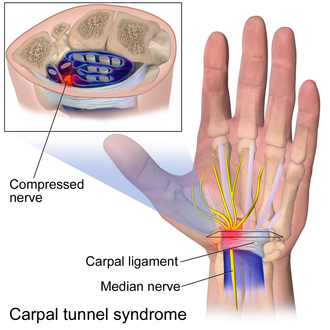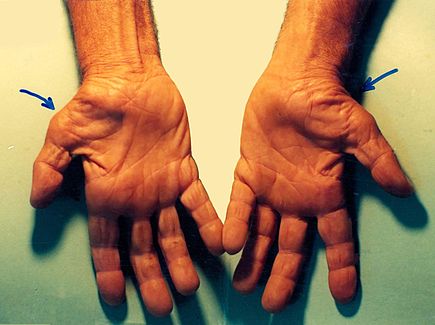|
BOOK NOW |
ASK ABOUT YOUR PAIN |
Home > Blog > Hand Therapy > Conditions >
Finger,
Hand, Wrist, Forearm & Elbow Conditions > Hand Pain > Carpal Tunnel Syndrome (CTS) Hand Physiotherapy
Carpal Tunnel Syndrome (CTS) Hand Physiotherapy
Anatomy of the carpal tunnel showing the median nerve passing through the tight space it shares with the finger tendons.
Carpal tunnel syndrome (often abbreviated to CTS) refers specificly to a nerve neuropathy in the carpal tunnel (see picture above). Our carpal tunnel is a small and narrow tunnel about 2 cm wide in the wrist; it is very tight tunnel where nine (9) flexor tendons plus the median nerve that runs through it.
The main purpose of the nerve and tendons are to primarily to provide function, movement, finesse, strength; as well as sensation and feelings from the thumb to the half of the ring finger.
Carpal tunnel syndrome is caused by repeated compression of the median nerve at the point in the carpal tunnel (repeated and/or resisted simple flexing of the wrist can cause this).
The compression of the median nerve causes muscle weakness (leading to weakness of our pinch and grip strength) as well as the loss/haywire of sensation in the distribution points of the nerve.
Most of the patients with carpal tunnel syndrome that our senior hand therapists treat complain firstly of numbness and tingling sensations that comes and goes, in the thumb, index finger, middle finger and partially in the ring finger.
This tingling sensations becomes more and more obvious, frequent, duration as the more the affected wrist is flexed for a sustained period, or repetitively, so activities that may aggravate it is: sleeping (where wrists are often flexed unconsciously), working etc.
potential irreversible long term damage
Patients are never advised to ignore their carpal tunnel syndrome wrists, because ignoring such nerve-related injuries such as carpal tunnel syndrome for the long term can cause irreversible nerve damage to the affected median nerve.
What this means is that one's median nerve can be damaged permanently, which causes permanent symptoms of:
- shrinkage/wastage of the muscles in the hand and wrist that are innervated by the median nerve (basically weak to very weak pinch, grasp, use of the thumb, index finger, middle finger)
- sensory loss and abnormalities (numbness, tingling, pins and needles, etc)
carpal tunnel syndrome classification
Carpal tunnel syndrome is grouped under RSI (repetitive strain injuries), which collectively means that it is a condition that is caused and/or aggravated by activities or exercises that has repetitive motions and movements.
The main groups of patients that we see with carpal tunnel syndrome usually are:
- sports and active people who play racquet games and games that uses wrist a lot like basketball, volleyball etc
- housewives and househusbands, cleaners
- new mothers and fathers; parents with young children which need/wants carrying
- office workers
These group of people regularly engage in tasks and activities that has repetitive movements.
Take housewives and househusbands for example, they will be participating in lots of:
- washing, squeezing and wringing cloths
- wiping, scrubbing
- ironing clothes, laundry, folding, hanging
For the new mothers and fathers and parents with young children, they often have to carry children/newborn repeatedly, which can be heavy and very repetitive.
other factors that contribute to carpal tunnel syndrome
There are another 2 factors that can influence carpal tunnel syndrome
Factor #1 Genetics and DNA
Unfortunately, some people are really more at risk to developing carpal tunnel syndrome due to genetic factors...and there is nothing much we can do about this (we cannot alter DNA and genetics, just work around it ie rest more, modify activities etc)...
Factor #2 Incorporating/Scheduling More Short Breaks (60 Seconds) Into Tasks
Ergonomic studies are pointing that workers and individuals who incorporate 60 second breaks which includes a stand-stretch and few steps every 15-30 minutes of work to:
- rest the static and shortened muscles
- encourage blood flow and circulation
conditions that may aggravate carpal tunnel syndrome
There are some medical conditions that may contribute to carpal tunnel syndrome, which includes:
- arthritis
- overweight / obesity
- trauma and force
- diabetes
- hypothyroidism
Other causes are internal factors that increase the pressure inside the carpal tunnel, as well as external factors that cause pressure from outside the tunnel, such as the presence of ganglions etc.
work that causes carpal tunnel syndrome
Work and businesses can cause and aggravate carpal tunnel syndrome in its people and workers.
It's not a nice co-relation, but this is the truth of the matter.
You see, a patient with carpal tunnel syndrome (especially if he or she prove that their CTS is directly caused by their work) will entitle them to:
- absenteeism (medical and hospital leave)
- compensation (from benefits, medical treatments, and in some cases, direct compensation because of carpal tunnel syndrome)
As we're senior physiotherapists and senior hand therapists, what we have encountered, experienced and concluded is that:
- patients with carpal tunnel syndrome doesn't want carpal tunnel syndrome, much less the benefits and compensation because of all its inconvenience (they want to be able to participate in activities outside work eg carrying and taking care of their children, participate in sports, cook etc)
- businesses don't want their employees and people to get CTS and be absent from work
how we can help
Our senior hand therapists is well versed in managing, treating and preventing carpal tunnel syndrome from occurring (one of the standard conditions we treat).
Our group is a specialist musculoskeletal, orthopedic and sports therapy group and are very accustomed to treating repetitive strain injuries including carpal tunnel syndrome, de Quervain's tenosynovitis, tennis elbow, golfer's elbow, etc.
If you'd like, we can go to companies/corporate to do:
- hands-on workshops
- health talks
to prevent these conditions from occurring.
hand therapy and physiotherapy for carpal tunnel syndrome
Some of the interventions for carpal tunnel syndrome includes:
- customized wrist splinting to offload the pressure and strain in the carpal tunnel (and protect the wrist from external forces and unnecessary flexion)
- protected mobilization to ensure tendon and nerve glide is healthy and unobstructed
- ultrasound therapy to accelerate soft tissue healing
- etc

